Poetry & Fiction
God Complex, Rachael Allen
Dr Rebecca Tamás, Lecturer in Creative Writing at City, University of London, recommends this ‘stunning, innovative poetry collection God Complex, which tells the story of a toxic relationship falling apart at the same time that the environment is degrading and being changed – poetry that speaks of the shared knot of our human and nonhuman bodies, our shared sufferings, our shared transformations.’
Also recommended by Lottie Limb, journalist at Euronews Green: '”thank god I am grieving / while the climate dims. What an effort otherwise” is a line that has lodged in my head all year. Through the pain of a failed relationship, the narrator reaches into our polluted environment – its toxic rivers, ill-greens and gagging birds – resensitising us to the damage in glorious, abject detail.’
Order through your local independent bookshop or online.
Ruin, Blossom, John Burnside
Patrick Romero McCafferty, Author of Glass Knot Sun (2025), recommends the late John Burnside’s final poetry collection, which ‘makes a pilgrimage through early faith, madness and landscapes rich with pre-Christian and German Romantic symbolism to explore the many ways we find shelter.’
Order through your local independent bookshop or online.
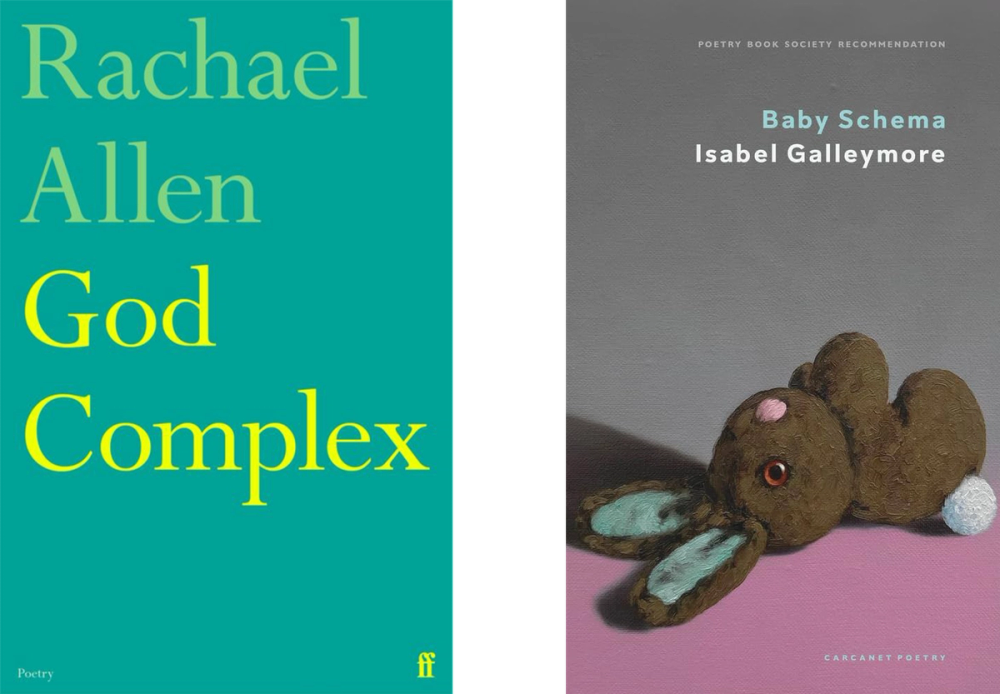
Baby Schema, Isabel Galleymore
‘Isabel Galleymore’s second poetry collection explores ecology through the unique and fascinating lens of cuteness. Galleymore zooms right in on the details (a slug, a doll, a certain cartoon mouse) to explore the big stuff: environmental care, late capitalism, the decision to have children. Through tight, precise language, the poems lead to an opening up, a new way of seeing’ says Billie Manning, a poet from Hackney (you can read Billie's work in And Other Poems, Magma, bath magg and more).
Order through your local independent bookshop or Carcanet Press.
Orbital, Samantha Harvey
Russell Warfield, Head of Communications at Possible, recommends this year’s Booker Prize winner: ‘the first winner which can plausibly be claimed as cli-fi. (It has also been shortlisted for this year’s inaugural Climate Fiction Prize). But it’s not just notable for its role in bridging cli-fi to the mainstream of literary fiction. You’ll be hard pressed to find a 2024 novel of any genre better than this. Set in a single day on a space station orbiting Earth, its inhabitants gazing down on our home planet, this slim volume with almost no plot dazzles with its imagery and captivates like nothing else I read this year.’
Order through your local independent bookshop or online.
North Woods, Daniel Mason
This is a sweeping novel about a single house in the woods of New England, told through the lives of those who inhabit it across the centuries and picked here by Katie Urquhart, Associate Editor at Yale University Press.
Order through your local independent bookshop or online.
How High We Go In The Dark, Sequoia Nagamatsu
Several recommended this novel, which according to Adrienne Buller, author and host of The Break Down, is a ‘harrowing, generation-spanning and deeply affecting set of stories documenting how we love and grieve on a changing planet. In a genre often defined by action and scientific speculation, this is an intimate take on “climate fiction”’.
Order through your local independent bookshop or online.
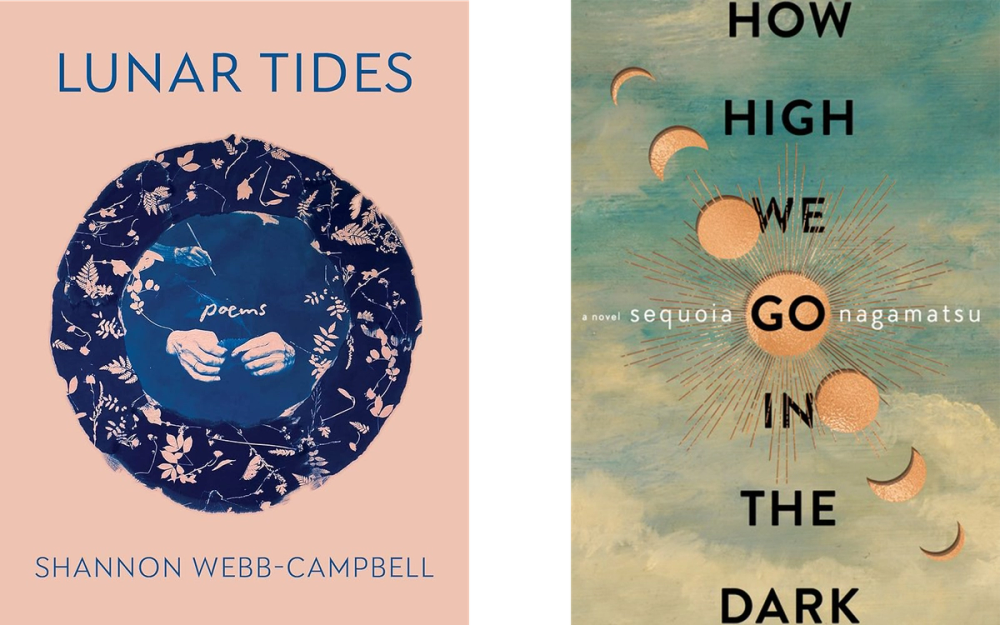
Lunar Tides, Shannon Webb-Campbell
Elspeth Wilson, writer and poet, said this was ‘a poetry collection that feels like swimming – sometimes easy, sometimes hard but always worthwhile and better for having engaged with it. Nature is always acknowledged as a co-collaborator in the collection, as are the author's ancestors, both settler and First Nations, and the way the book uses the cycles of the moon for its structure lends it a rhythmic pull with many poems written as incantations.’
Order through your local independent bookshop or Book*hug Press.
Non-fiction
The Burning Earth: an environmental history of the last 500 years, Sunil Amrith
‘Amrith's history explores the longstanding human pursuit for prosperity and its profound human and ecological costs. It forces us to think more deeply about what it means to change our relationship with the planet, without losing sight of its necessity’ says Martha Dillon, writer and city climate policy specialist.
Order through your local independent bookshop or online.
Material World: a substantial story of our past and future, Ed Conway
‘If we are to understand the ever evolving climate crisis, we need to better understand the raw materials that go into the goods and services we use everyday – and Conway's book Material World is as great a starting point as any’, according to Níall Glynn, Economist and researcher.
Order through your local independent bookshop or online.
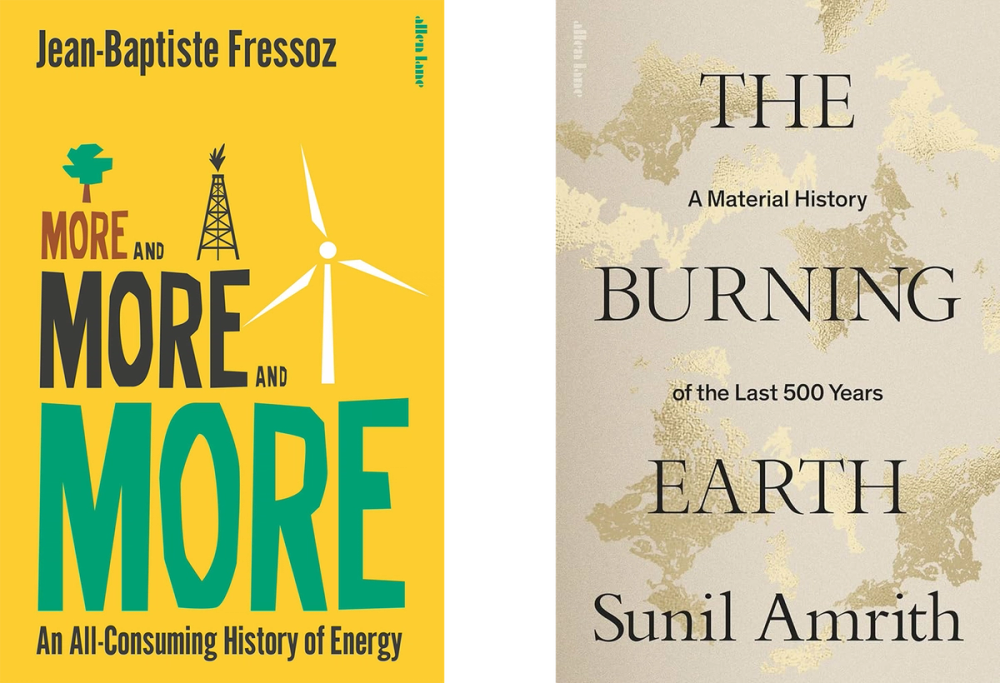
More and More and More: an all-consuming history of energy, Jean-Baptiste Fressoz
Laurie Laybourn, Director of the Strategic Climate Risks Initiative, says that ‘in this path-breaking and readable book, Fressoz shows that, contrary to mainstream opinion, there have been no full energy “transitions”, only energy “additions”, with the emergence of a new fuel boosting the use of the old, which means fossil fuels will only go when they are actively removed, something markets cannot do alone.
Order through your local independent bookshop or online.
A Nutmeg's Curse, Amitav Ghosh
Several people we asked read Ghosh’s second non-fiction work in 2024, including Imandeep Kaur, Co-Founder and Director at CIVIC SQUARE, and Scott McAulay from the Anthropocene Architecture School. The book traces our contemporary planetary crisis back to the discovery of the New World and the sea route to the Indian Ocean. It argues that the dynamics of climate change today are rooted in a centuries-old geopolitical order constructed by Western colonialism.
Order through your local independent bookshop or online.
Crude Capitalism, Adam Hanieh
According to Adrienne Buller, author and host of The Break Down, ‘it's hard to imagine that there's anything particularly new to say about oil and capitalism, but Adam Hanieh manages to provide a completely innovative and insightful journey through the development of the oil economy and its mutually constitutive relationship to contemporary capitalism. There's no better analysis of the predicament we are now in – from the pervasiveness of petroleum products to the growing might of state-owned oil majors – than Crude Capitalism.’
Order through your local independent bookshop or online.
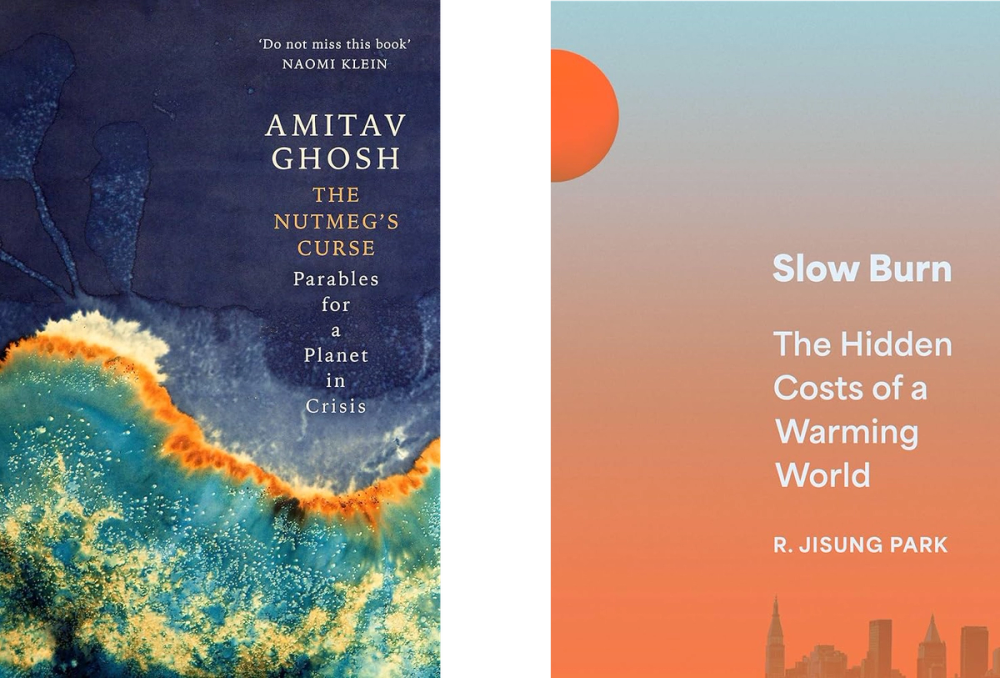
Slow Burn: the hidden costs of a warming world, R Jisung Park
James Meadway, Economist and host of the Macrodose podcast, told us this was ‘an urgent challenge to the climate movement: what happens when climate change doesn't mean the Apocalypse, but the "slow burn" of everyday life slowly and steadily getting worse? Packed with vital new empirical research, Park presents the liberal case for capitalist adaptation to a climate-shocked world. It should be read critically by everyone who suspects we imagine the end of the world a little too easily.’
Order through your local independent bookshop or online.
Doppelganger: a trip into the mirror world, Naomi Klein
Polly Bindman, Investigative Journalist at Global Witness picked the 2024 winner of The Women’s Prize for Non-Fiction: ‘consumed by a particularly perverse case of mistaken identity with prominent right wing conspiracy theorist Naomi Wolf, Naomi Klein (writer, leftist stalwart, climate activist) takes us on an obsessive journey down the rabbit hole of conspiracy theories, spitting us out into the ‘mirror world’, where clouds aren’t real and covid (and climate change) are a hoax. This book is jammed with fun anecdotes; it also provides a serious diagnosis of how far right narratives have burrowed their way into the mainstream, fracturing the social fabric and posing a serious threat to our chances of creating a just, liveable world.’
Order through your local independent bookshop or online.
Groundbreakers: the return of Britain's wild boar, Chantal Lyons
Editor of Inkcap Journal and author of Nature's Ghosts, Sophie Yeo, told us that ‘the reintroduction of large mammals is a hot topic in conservation right now – what is less discussed is that Britain already has a thriving population of large wild pigs, which roam the Forest of Dean, where they are beloved and feared by residents in equal measure. Lyons writes with nuance and elegance about this controversial beast. Groundbreakers leaves you wishing for more wildness in the landscape, without shying away from some of its more challenging consequences.’
Order through your local independent bookshop or online.
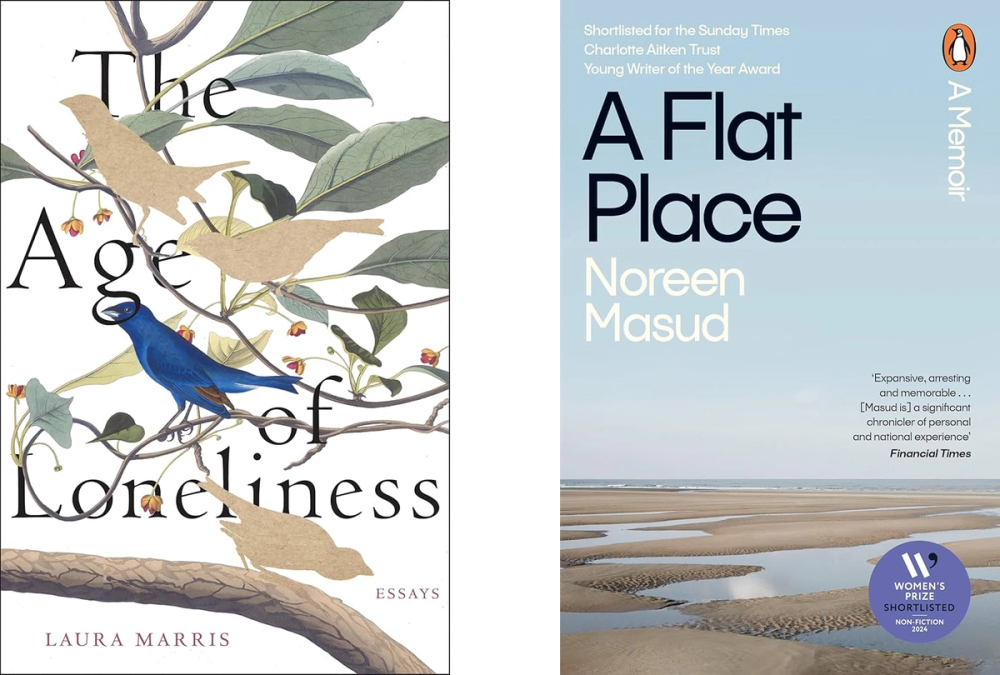
The Age of Loneliness, Laura Marris
‘The Age of Loneliness has stuck with me’ says It’s Freezing in LA! Editor Jackson Howarth. ‘Laura Marris' wonderfully emotive collection of lyrical essays explores both human and non-human loneliness and how we reach out in an increasingly sparse world.’
Order through your local independent bookshop or at Greywolf Press.
An Oral History of the Palestinian Nakba, Eds. Nur Masalha and Nahla Abdo
‘As a dyslexic babe, I like to buy books that I can pick up and put down. That’s why I enjoy collections and anthologies. The collection of stories within this book viscerally convey the importance of orality as an embodied and unending knowledge centre and why oral histories need to be safeguarded and archived under oppressive systems. A must read’ according to Georgina Johnson, Editor and creator behind The Slow Grind – intersectional environmentalist books holding together global perspectives on climate and social justice.
Order through your local independent bookshop or online.
A Flat Place, Noreen Masud
Kitty Grady, writer and digital editor at A Rabbit's Foot, recommended this love letter to Britain's breathtaking flatlands, from Orford Ness to Orkney, which reckons with the painful, hidden histories they contain.
Order through your local independent bookshop or online.
Namesake, NS Nuseibeh
Elspeth Wilson, writer and poet, recommends this ‘beautifully-written collection of essays that considers gender, heritage, land, colonialism and identity when you have links to multiple places. Weaving a largely secular look at Islamic history and myth-making with personal reflection, this book by a British-Palestinian author is especially essential reading during a time of genocide and accompanying ecological disaster.’
Order through your local independent bookshop or online.
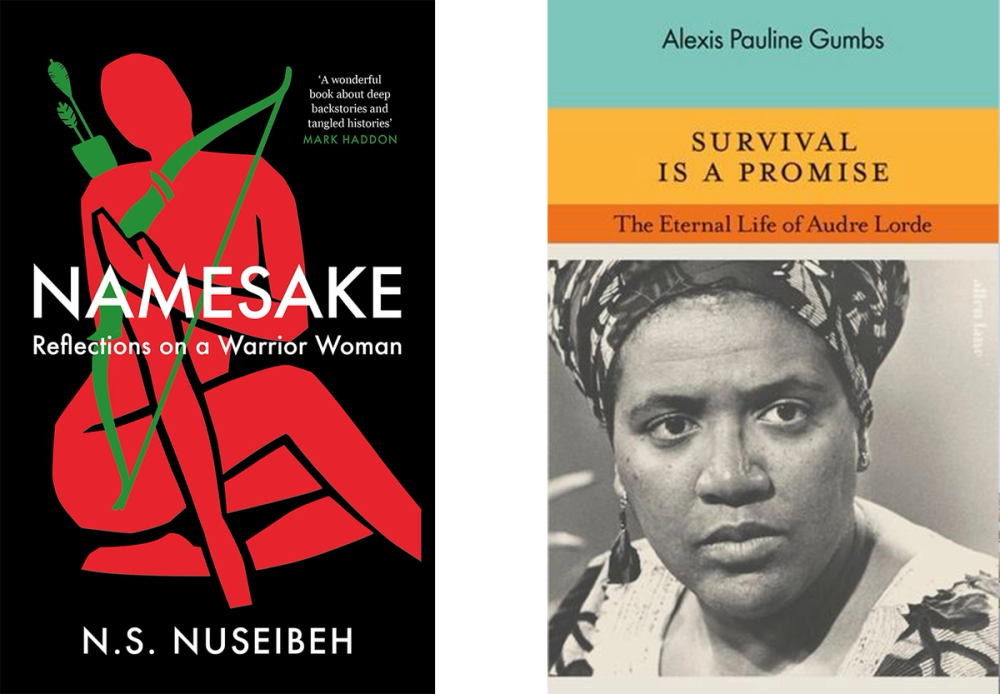
Survival is a Promise: the eternal life of Audre Lorde, Alexis Pauline Gumbs
Ashish Ghadiali, artist & curator and director of Radical Ecology, picked this ‘unique literary biography by the author of Undrowned that reveals how environmental imagination works as the beating heart of Audre Lorde's black feminist poetic of liberation and solidarity.’
Order through your local independent bookshop or online.
Half Earth Socialism: a plan to save the future from extinction, climate change and pandemics, Drew Pendergrass and Troy Vettese
Diyora Shadijanova, journalist, columnist and Hothouse bookclub co-organiser, was reading this in 2024: ‘for those caught in the doom cycle of the climate crisis, Half Earth Socialism offers a vision of a post-capitalist world centered on rewilding, renewable energy, and fundamentally reshaping our lives to reduce carbon intensity. Paired with an interactive online game, it provides readers with imaginative ways to chart a new course away from our current trajectory.’
Order through your local independent bookshop or Verso.
The Farmer's Wife, Helen Rebanks
‘An ode to the rootedness of rural communities, and the cultural and social significance of small family farms. Helen writes beautifully, and this is a movingly honest and unapologetic celebration of the importance of farming and its link with domesticity and a sense of home’ according to Ele Gower, food systems strategist, who focusses on the shift to sustainable farming in ugly, unhealthy and seriously imperfect corporate food systems.
Order through your local independent bookshop or online.
Shado Mag, including What Is Green Colonialism and “Wallah my grandmother knows everything”, Tatiana Garavito, Juliana Vélez-Echeverri, Emilie Muszczak, Lillie Aissa-Jeanrenaud & Javie Huxley
Guppi Bola & Nonhlanhla Makuyana, the double trouble duo who have been running Decolonising Economics for the past five years ‘love Shado Mag's commitment and resourcing of BPOC organisers, and their visionary approaches to bring struggles for justice to life – these two selections represent two of our most valued roles in the movement, care-based organising and storytelling, demonstrated by our pals Javie (Nourishing Economics) and Tatiana.’
You can find Shado Mag by clicking here.
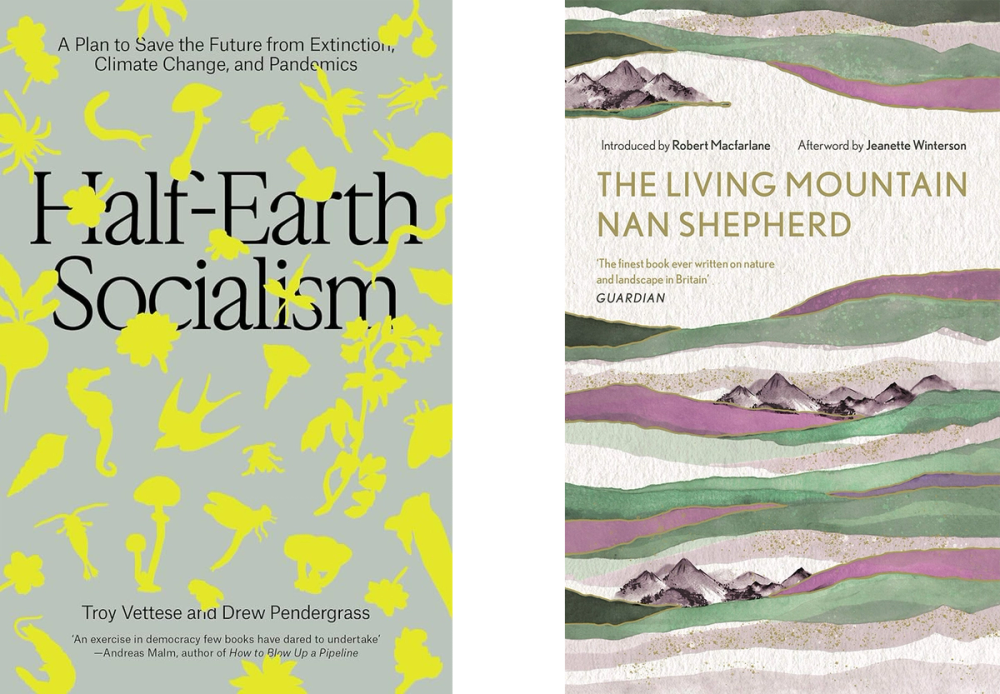
The Living Mountain: a celebration of the Cairngorm mountains of Scotland, Nan Shepherd
Alexander Harris, Idea Store Tower Hamlets, picked this classic masterpiece of nature writing, in which Nan Shepherd describes her journeys into the Cairngorm mountains of Scotland.
Order through your local independent bookshop or online.
Exhausted of the Earth: politics in a burning world, Ajay Singh Chaudhary
Smith Mordak, Chief Executive of the UK Green Building Council recommends this new work by Ajay Singh Chaudhary, the executive director of the Brooklyn Institute for Social Research. The book connects our exhaustion and that of the planet, exploring whether the status quo is to blame and arguing for political struggle between those attached to the power, wealth, and security of 'business-as-usual’.
Order through your local independent bookshop or Repeater Books.
Confronting Climate Coloniality: Decolonizing Pathways for Climate Justice, Ed. Prof. Farhana Sultana
This collection brings together cutting-edge interdisciplinary scholarship and ideas from around the world to present critical examinations of climate coloniality. It exposes how legacies of colonialism, imperialism, and capitalism co-produce and exacerbate the climate crisis, create disproportionate impacts on those who contributed the least to climate change, and influence global and local responses.
Order through your local independent bookshop or online.
Designing for Society: products and services for a better world, Nynke Tromp and Paul Hekkert
Picked by Kyle Turakhia, Birmingham Hub Manager at the National Literacy Trust, who described it as ‘a readable, step-by-step guide to creating infrastructure that encourages civic behaviour, including climate-conscious choices’.
Order through your local independent bookshop or online.
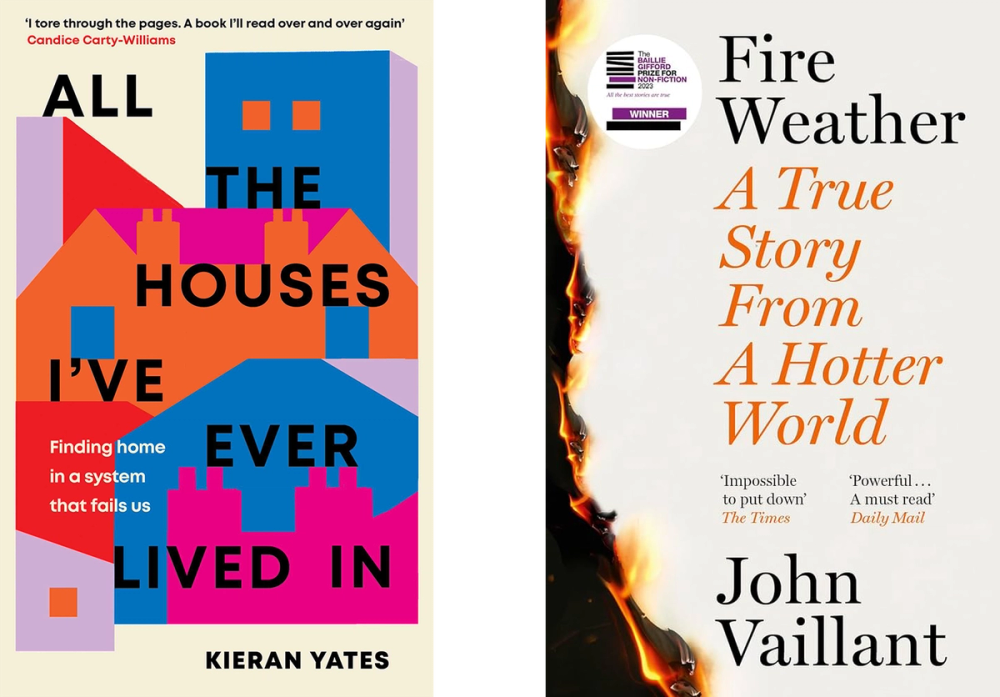
Fire Weather: a true story from a hotter world, John Vaillant
Another one that many we asked recommended, including Joycelyn Longdon, an environmental justice researcher and educator who runs @ClimateInColour. ‘I had the pleasure of reading this book as a judge for the Wainwright Prize and was blown away. It is not a book I would have picked up had I not been introduced to it in this way and I was immediately hooked. The writing is beautiful and captivating, the storytelling intense and deeply informative. Some might find it a bleak and heavy book to hold, but I felt it connected me deeper to the histories and structures of oppression on this planet, the way they wreak havoc on people and planet and the ways in which we must resist them.’ Jeremy Till, Professor of Architecture, Central Saint Martins UAL, called it ‘pretty gobsmacking.’
Order through your local independent bookshop or online.
All The Houses I've Ever Lived In, Kieran Yates
Venetia La Manna, Fair fashion campaigner and Women’s Prize for Non-Fiction 2024 judge, picked this: ‘love letter to home and community. Drawing on personal experience, interviews with tenants and the stories behind homewares, Kieran highlights the invaluable work of community organisers who have led the way to change and improve the housing system, inviting us to re-imagine what the future of housing could look like.’
Order through your local independent bookshop or online.
Nature's Ghosts, Sophie Yeo
Another common pick from those we asked, this 2024 Wainwright Prize for Writing on Conservation shortlistee examines how the planet would have looked before humans scrubbed away its diversity: from landscapes carved out by megafauna to the primeval forests that emerged following the last Ice Age, and from the eagle-haunted skies of the Dark Ages to the flower-decked farms of more recent centuries.
Order through your local independent bookshop or online.
More Reads
Literature
‘To Be or Not To Be’: contemplating human extinction in storytelling
Keep readingVisions of alternative futures can be incredibly powerful in the face of the climate crisis, but what does it mean to consider a future without humans? In this personal reflection, illustrator and academic Tom Hubmann suggests speculative visions, storytelling and narratives concerning a future without humans are difficult to contemplate, and yet, in that difficulty, they redirect our attention towards new understandings of the present and the possibility of reshaping what happens next. Edited by Adrian Holme.
By Tom HubmannKeep readingLiterature
Squinting at Mountains: a review of Zsuzsanna Gahse's Mountainish
Keep readingJemima Skala explores the way we think about mountains, through the lens of Mountainish by Zsuzsannah Gahse, which won the Swiss Grand Prix for Literature and was recently translated into English. Drawing on other giants of mountain literature, such as Nan Shepherd, Skala examines the way that mountains become diffuse with experience, melding the 'human' and the 'natural'.
By Jemima SkalaKeep readingLiterature
Re-Imagining the Future: encouraging diverse visions of social and environmental justice
Keep readingIn this legacy article, first published in short form in our third issue, Lola Young, Baroness of Hornsey explains how storytelling can help tackle intertwined social and environmental issues, encouraging innovative solutions from marginalised voices. Lola Young has worked extensively with charities, organisations, and parliamentary groups to tackle issues ranging from modern slavery and Transparency In Supply Chains (TISC) to climate change, and diversity within the environmental movement.
By Lola YoungKeep reading- Read more